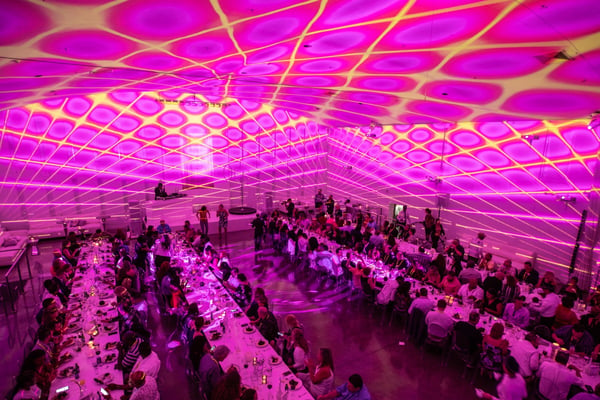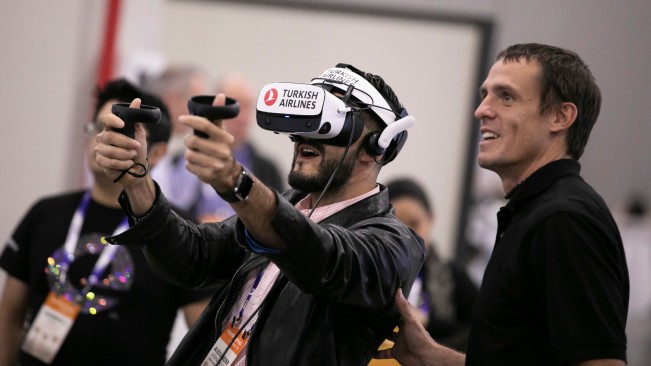
Events are back in full swing! 2022 saw a marked difference from the past few years when the pandemic and continuing safety concerns caused in-person event numbers to plummet as the use of virtual and hybrid events rose. While event planners are known for their swift problem-solving skills, the pandemic made us realize that the industry was capable of adapting and evolving on a much larger scale than many thought possible.
So what do event planners do with that fact in 2023? We take the lessons and meet the challenges. Thankfully, some of these challenges have resulted in new, exciting trends for the industry. We’ll see some of last year’s trends retain their “trending” status, but let’s take a look at what 2023 holds.
Why Event Trends Matter
Event trends give us insight into what’s important to our clients and attendees. Identifying and prioritizing those values informs everything from venue and food and beverage options to scheduling, activities, and entertainment.
As event planners and hosts, tapping into these trends demonstrates an understanding of our audience that not only helps us create memorable events but also fosters the kind of connection and understanding event guests are seeking.
For example, during the pandemic, we realized that health and wellness was (and continues to be) important to event attendees, and as a result, food menus shifted to include healthier options, such as smoothies, salads, teas, and mocktails over cocktails. Similarly, relaxation, exercise, and outdoor activities were scheduled for destination meetings and events to satisfy guests. As one would expect, many people shifted inward during the pandemic, so those same self-care and wellness trends are carrying over.
Top Six Event Trends for 2023
As 2022 drew to a close, event planners were beginning to get a solid understanding of what event trends might manifest for 2023, along with trends from the previous year that will be around for some time to come. Because a new year means looking at what’s to come, we took the time recently to chat with Amber Heintz on our podcast about the industry outlook and event trends for 2023. Discover even more trends to consider below.
1. High Expectations, Lower Budgets
Perhaps the trend we’re seeing the most is event hosts hoping to produce the same quality events they’ve had in the past, but ones that leave a lasting impression on attendees – not on their bottom line. With companies concerned about inflation and a potential recession, many are looking to cut costs. Inflation often means that those reduced budgets won’t go as far as they once did. However, the ROI and value of events is still significant. In fact, certain industries, such as the pharmaceutical industry, rely heavily on events and meetings throughout the year. Thankfully, a creative event agency with years of planning experience can handle the need to cut costs without sacrificing the event experience.
2. Event Technology
This is one of the most obvious places where we see trends not only emerging but also gaining traction. In many ways, technology continues to revolutionize the event space. Largely driven by pandemic health concerns, we saw the rise of both virtual and hybrid events. While there are benefits of hybrid and virtual events, in-person events are expected to reign supreme.
Still, there are even more event tech trends to tap into, including:
- Event apps – While event apps have been around for years, they are more popular than ever. Not only do they allow event hosts to create connections with guests before, during, and after events, but they facilitate scheduling and communication, including post-event surveys. In fact, you’ll see many event planners double down on apps in the coming year. They’re a great way to provide information, create communication channels, and drive participation and engagement well before the event begins. Additionally, new features continue to emerge that event planners can tap into, such as AI-powered matchmaking and smart networking.
- Data-driven agility – One of the best aspects of the aforementioned technology is the amount of data event hosts and event planners can gather. From attendance and traffic data broken down by session to data acquired from virtual attendees, event organizers have the ability to tailor future events based on this data. In fact, with RFID data, some of those decisions can be made in real time. Have a popular session that’s running long with robust attendee participation? Send out a push notification to give your audience five more minutes and delay the next session. Have a session with low registration? Modify your agenda to add another section of a more popular session or create a new session with content more aligned with attendee interest. You can even add post-event content specific to your most attended sessions.
- Artificial intelligence (AI) – As we briefly touched on above with smart networking, AI is a huge topic being discussed by just about everyone, and the events industry is no different. Networking is obviously one area where this can be utilized. Having AI-powered matchmaking allows attendees to network with those with similar interests, roles, and other characteristics that would make them more likely to connect. AI can even help sponsors or exhibitors achieve better ROI by utilizing data to match them with better potential leads. And it doesn't stop there. This incredible technology can also help save guests time when trying to determine what sessions to attend by recommending ones that would be most beneficial to them specifically. Another excellent example of how AI can enhance your events are chatbots. While these have been around for some time, their presence is only going to increase as AI’s ability continues to improve. Not only are chatbots a huge help to attendees who want information quickly, but it also takes stress off of your team to ensure they’re not fielding thousands of questions manually.

- Augmented/virtual reality – While these two techs remain on the periphery, there’s a considerable amount of interest – enough so that even though they’re not used to their full potential yet, the markets are expected to continue to grow with big tech companies heavily involved. Check out our technology trends blog for more details on how these technologies will impact events.
- The metaverse – Though the metaverse is still in its infancy, this online world allows users to experience truly immersive events. Recently, a few concerts and other celebrity celebrations have been hosted online, but keep an eye out for this technology to grow as it may become more mainstream and change the face of virtual events. The push to host programs online will also change the timing of corporate events. With a world that never closes, attendees could potentially join meetings when convenient, regardless of time zones, with all content on-demand.
Additionally, VR meeting spaces may be on the horizon and will include VR avatars to represent attendees. VR spaces could supplement popular video conferencing platforms in use today, such as Zoom or Teams. Creating the virtual space and physical representation of individuals within a room – to truly recreate the meeting experience – may alleviate some of the disconnect that can occur in virtual meetings.
3. Increased Focus on Experiences
There’s no doubt that the pandemic changed us all in significant ways, but the desire for rich and meaningful experiences will continue to impact the events space for years to come. It is, perhaps, one of the reasons in-person events came back in full swing in 2022.
- Experience-first events – In our blog on creating event experiences, we noted guests want to do more than attend. They want to experience and participate, to be active rather than passive. This trend is growing in importance as millennials continue to fill the workforce and will make up 75% of labor by 2025, and this generation craves experiences. In fact, 78% of millennials prefer experiences over materialistic things and 69% of them value the kinds of connections created through shared, in-person experiences.
That means the days of sitting in session after session listening to others speak may not be the best way to engage these attendees. Thankfully, millennials have many ways to reach them, which means you can incorporate other trends that appeal to them, such as mindfulness, corporate responsibility, and sustainability. Think volunteer trips or local activities while at a destination. - Building in breaks – We’ve always been a huge proponent of making sure to build time into events for attendees to grab a cup of coffee or just relax for a bit, but with the importance of experience increasing, making sure not to over schedule your events is even more important. People want time to not only destress but also explore the city where an event is taking place. Or maybe you could build time in for a unique off-site activity to experience. Either way, don’t have your attendees sit through hours and hours of sessions with no breaks. Doing so can backfire and cause attendees to retain less and become less focused on the content.
- New, smaller cities – As we mentioned, one of the biggest challenges of the current events landscape is limited budgets and limited venue availability. Everyone’s clamoring for what Amber called in our podcast tier-one cities (such as New York or Chicago), and while these are tried and true options, trying new cities that you haven’t hosted in can actually be beneficial. Not only can these new, smaller cities potentially have more availability, but they also could allow attendees to visit a place that they haven’t been to before. A creative event planner can still deliver the wow factor in amazing (but slightly smaller) cities.
4. Personalization
In 2022, we understood that the desire for personal connection is what drove the high demand for in-person events. Let’s be real; we’ve all had plenty of time to get to know ourselves, and now we’re ready to grow personal connections while also being recognized as individuals.
- Segmented communication – Event apps will shine for a variety of reasons this year. Helping you personalize your event is just one way. Yes, your event app is great for sending updates and information, but what about special invites to specific guests? For example, if you have speakers who will be available to meet and talk with guests during an informal event, send an invite to guests who attended their sessions. Similarly, depending on the data you’ve collected regarding attendees, you can create special sessions, informal cocktail hours, or other activities specifically for them.
- App customization – Speaking of the app, allow your guests to customize modules, alerts, and even color schemes. You want them to use the app leading up to and during the meeting, so allow them to customize the app to encourage adoption and use.

- Personalized event gifting – We all know how much attendees love a good swag bag. You have the opportunity to go above and beyond by having their names on the bags and by tailoring the contents to their interests based on data collected. Again, the information you have on attendees can help you truly make these special.
- Tailored tracks – Create tracks within your event and allow your attendees to follow paths that are designed to appeal to their interests or goals. For example, if you have a series of speakers or sessions that focus on leadership skills, create a track for attendees who want to build that skill.
- Provide choices – To personalize an event, you don’t need to have all the guest data. In fact, one of the best ways to personalize your program is by letting your attendees make choices. Giving choices on gifts, meals, activities, and session tracks can make an event feel special for each attendee.
5. Sustainability and Corporate Responsibility
While sustainability and corporate responsibility were already on many people’s radars, more people are becoming aware of their consumption and environmental impact. Thankfully, not only are more businesses aware of the ways in which they can limit their carbon footprint and impact on their communities, but there are also a variety of ways for event planners and hosts to include sustainability and corporate responsibility in their meetings and events.
Our blog on corporate responsibility discusses opportunities for virtual, live, and hybrid events, including:
- Volunteering
- Fundraising
- Matching gift programs
Our blog on sustainability also includes a variety of ways you can make your event more environmentally friendly, such as:
- Going paperless
- Encouraging eco-safe products and recycling
- Limiting travel through virtual options and centralized locations
- Utilizing green or eco-friendly vendors and partners

6. Health and Well-Being
During the pandemic, event attendees expected their safety to be addressed, even as COVID regulations loosened. One big holdover has been the ways many of us are more mindful about how we can better care for our minds and bodies. That means including some of those features in events moving forward (and expecting health and wellness to be evergreen).
- Contactless interactions - RFID and other technology make contactless interactions easier. Everything from registration to payments can be handled without direct contact between staff and attendees.
- Mindfulness and relaxation time - One thing attendees did not miss about events during the pandemic was the often busy schedules that kept them moving non-stop, morning to night. A good way to escape this stress is to include services that focus on relaxation. By providing an opportunity for a chair massage between sessions, a morning yoga class, or a relaxation station, you are allowing guests to leave your event rejuvenated.
Simply tapping into current trends can make your event even more memorable, but finding new and interesting ways to include these trends will truly delight your guests. Bishop-McCann prides itself on our ability to be creative in designing and executing event experiences.
If you want to start planning your next corporate event, we’re ready to help you explore these trends and more. Get in touch with our team today, and let’s start planning!

